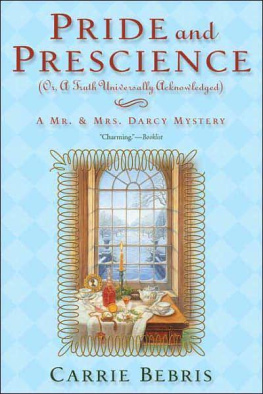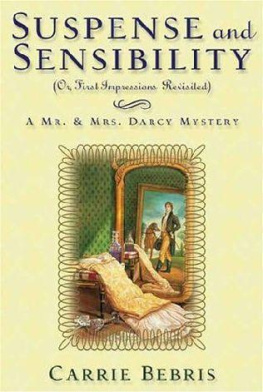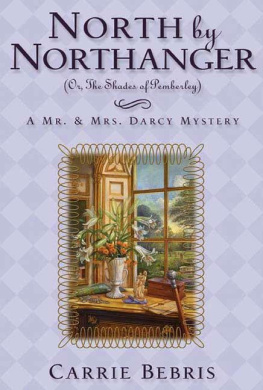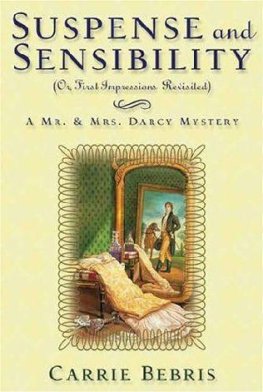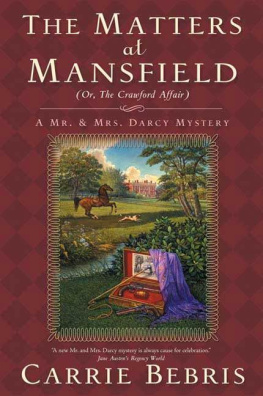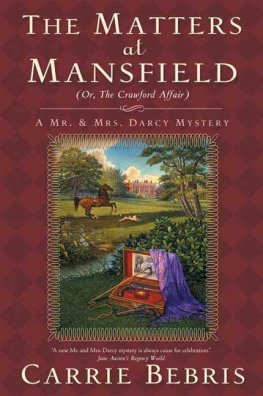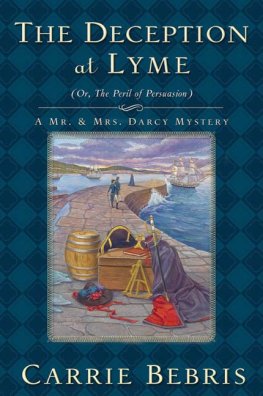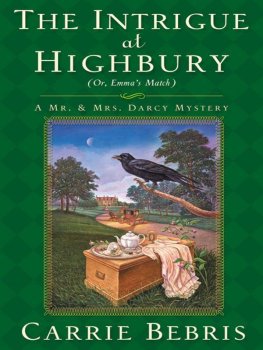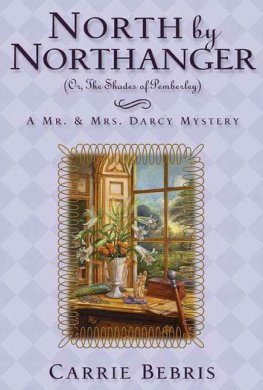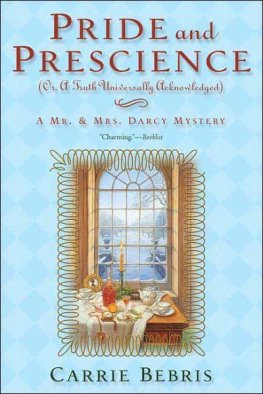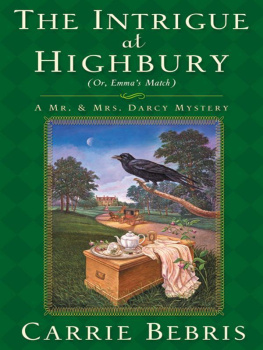Annotation
When Caroline Bingley marries a rich, charismatic American, her future should be secure. But strange incidents soon follow: nocturnal wanderings, spooked horses, carriage accidents, an apparent suicide attempt. Soon the whole Bingley family seems the target of a sinister plot, with only their friends the Darcys recognizing the danger. A jilted lover, an estranged business partner, a financially desperate in-law, an eccentric supernaturalist--who is behind these events? Perhaps it is Caroline herself, who appears to be slowly sinking into madness....
Carrie Bebris
Pride and Prescience or,
A Truth Universally Acknowledged
For Katherine and James
Acknowledgments
This novel is the work of more than two years, during which my life changed in ways unfathomable to me when I first typed the words "Chapter One." In the period of its gestation, I found myself facing personal challenges of an unexpected nature. Many days, it was difficult to leave the present behind and slip into Regency England to spend time with Elizabeth and Darcy -- but once there, it was like entering the home of old friends. I came to understand, more than ever before, Rudyard Kipling's words: "There's no one to touch Jane when you're in a tight place."
There is indeed no one who approaches Jane Austen's ability to help one through a tough time -- except the individuals mentioned here. I am indebted to the following people, without whom neither this book nor I would be what we are.
My family, both immediate and extended, for support in forms too numerous and profound to list.
Anne Klemm, a kindred spirit whose friendship has nurtured my writing and my enjoyment of Jane Austen in so many ways -- from book discussions and an Austen pilgrimage through England, to brainstorming and critiques. If we were not Jane and Cassandra in a previous life, we were surely sisters.
Theresa Nunemacher and Diane Welch, for the gift of their friendship. And also, along with Alyssa Hoff and Karen Ellsworth, for giving me time and space to write.
Stan! Brown, for helping me find my way back to Netherfield when the path grew dark.
Victoria Hinshaw, Andrew Hughey, Julia Martin, Lisa Bernard, and Peter Archer, for generously sharing their expertise.
Ed Greenwood, for kindness to a fledgling writer.
My fellow members of the Jane Austen Society of North America, for sharing their knowledge of and enthusiasm for Austen and her writing. I especially thank Joan Philosophos and Marsha Huff for their encouragement. Joan, I wish I could give you a copy of this book, but I know you read it over my shoulder as I wrote.
My editor, Brian Thomsen, for helping me turn an idea into reality.
And, of course, Jane Austen.
It is a truth universally acknowledged, that a
single man in possession of a good fortune,
must be in want of a wife.
-- Pride and Prejudice, Chapter 1
One
Happy for all her maternal feelings was the day on which Mrs. Bennet got rid of her two most deserving daughters.
Pride and Prejudice, Chapter 61
On the day Miss Elizabeth Bennet wed Mr. Fitzwilliam Darcy, she did not mind dividing with her elder sister, Jane, the notice due a bride. Indeed, she had been delighted when Jane chose to marry Mr. Charles Bingley in a double ceremony. It seemed only right that two sisters and two men who were themselves particular friends should all embark on their new lives together, and she hoped the event presaged many happy hours spent in each other's company in the years ahead.
Elizabeth did mind, however, sharing the stage with Mr. Bingley's sister Caroline.
The new Mrs. Darcy glanced across the drawing room of Longbourn House. Miss Bingley and her fiance, Mr. Frederick Parrish, sat beside each other on the sofa, monopolizing the attention of half the wedding guests. Their immediate spectators included two of Elizabeth's younger sisters, assorted aunts and uncles, and Caroline's sister, Louisa Hurst. The couple's chatter had also drawn the observation of others in the room. Mr. Bennet looked on with amusement, her mother with annoyance, her cousin Mr. Collins in uncharacteristic silence, and the Gardiner children in awe. The audience wanted only the addition of the Prince Regent himself to comprise the most unlikely party in all England, but, unfortunately, no one had thought to invite him.
Elizabeth knew little of Mr. Parrish, in fact had never met the American before today. According to Miss Bingley, he was a gentleman of the first consequence. He had one townhouse, two carriages, three tailors, and could walk on water every other Tuesday. He also, anyone within auditory range had been given to understand, was a wealthy landowner, a patron of the arts, and a master of the intricate "ballroom" style of folding one's cravat.
Elizabeth had not yet conversed with Mr. Parrish, and based on Miss Bingley's praise had little inclination to do so. She suspected, however, that of the myriad attributes proclaimed by his fiancee, the gentleman's chief recommendation lay in the simple fact that he had chosen Caroline, from among all the unattached young women of the Polite World, as the object of his affections. How an otherwise sensible-seeming man had allowed that to happen, Elizabeth could only speculate; she attributed it to either a momentary lapse of reason or a prolonged lapse of sobriety.
"Lizzy! Jane!" Mrs. Bennet bustled over to the quiet corner where, beckoned by early winter sunlight edging its way past the draperies, her second daughter had sought a moment's respite from her social duties. Jane, concern clouding her face at their mother's summons, hurried to join them.
Elizabeth sighed at the impending but not unexpected intrusion. She'd known her interlude would prove fleeting on a day such as this; nevertheless, she'd strayed over here to indulge in reflection. After one-and-twenty years, these were her final hours as an inmate of this house, and, though not by nature an overly sentimental person, she'd wanted a chance to bid it farewell in her heart before going away. Fortunately, a very short span of time had sufficed. Her mind had soon wandered to Miss Bingley and other more prosaic thoughts, the interruption of which mattered little. "What is it, Mama?"
"My poor girls, how dare that woman try to spoil your day!" Mrs. Bennet, her bosom heaving and complexion flushed, expressed her indignation with all the wounded vanity the mother of two brides could muster. "To announce her own engagement at your wedding breakfast--"
Elizabeth wished her mother possessed a voice one-tenth its volume. "Mama, everyone here knows this is our day, not hers."
Jane extended a placating hand, as if to literally smooth their mother's ruffled feathers. "I am sure my new sister doesn't mean to draw notice toward herself."
At Jane's defense of Miss Bingley, Elizabeth couldn't stifle a laugh. "Dear Jane, only you could be so generous. She was circulating the news while we were still in the receiving line." Her gaze turned back to the newly betrothed couple. Miss Bingley beamed at something Mr. Parrish said, an expression Elizabeth had rarely seen on the woman's typically haughty countenance. It softened the severe lines of her cheekbones and upward tilt of her chin, lending her an almost pleasant aspect. "Much as I hate to admit it, he seems a good influence on her."
"He's more than that woman deserves," Mrs. Bennet whispered too loudly for Elizabeth's comfort. "And his fortune! Lady Lucas told me he just inherited an enormous sugar plantation in Louisiana. It has a French name... Mont-Joyo, or something like that. He's easily worth ten thousand a year. Ten thousand, Lizzy -- same as your Mr. Darcy!" Her mother's tone became reverent at the mention of Mr. Darcy. Though he was now her son-in-law, Mrs. Bennet, like many of Darcy's acquaintances, yet found him a formidable man.

